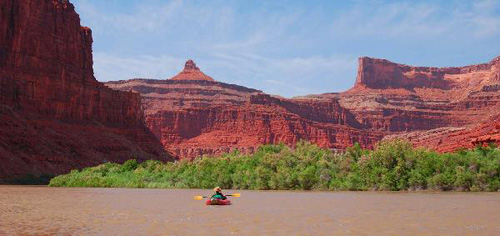
This week marks an historic turning point for people who love the wild canyon country and sweeping mesas of Southern Utah. For the first time, the U.S. House Subcommittee on National Parks, Forest, and Public Lands will consider a bill designed to protect millions of acres of spectacular Utah lands as wilderness.
All of these lands -- some of the last great places on earth -- are owned by the public, but most of them remain vulnerable to industrial development. America's Red Rock Wilderness Act would protect them from oil and gas development, uranium mining, and off-road vehicle use. Meanwhile, hunters, anglers, hikers, and families could continue to enjoy these lands, including the renowned Cedar Mesa, San Rafael Swell, and the Book Cliffs.
This is our chance to be present at the creation. If we pass the Red Rock Wilderness Act, we can tell our grandchildren that we helped birth the latest Yellowstone. We can say we preserved treasures equal to Zion, Arches, and Canyonlands National Parks. We can add to the wilderness inheritance of future generations, and they will thank us for it.

I love the extraordinary lands encompassed in America's Red Rock Wilderness Act. I have spent decades exploring them, and I am still awed by the beauty of their serpentine canyons and alcoves filled with stone houses built by the ancestors of today's Pueblo people. I have profoundly inspiring memories of the time I've spent hiking with my family under sculpted arches, through pink sand dunes and across mesas that open up to a sea of redrock vistas.
Fortunately, there is growing support in Congress for protecting precious wildlands like these. This February, Congress passed the Omnibus Public Lands Act -- the most significant conservation law in decades. The law designated more than 2.1 million acres of wilderness in nine states. Significantly, this was a bipartisan effort.
America's Red Rock Wilderness Act, introduced by true champions Senator Richard Durbin and Congressman Maurice Hinchey, also has bipartisan support. It has a remarkable 139 cosponsors in the House and 31 in the senate--that's almost 1 out of every 3 Members of Congress.
I believe two key forces are fueling this renewed desire to protect the public's lands.
First, lawmakers are finally recognizing the toll climate change is taking on fragile landscapes like Southern Utah. The highly regarded NRDC is releasing a report tomorrow documenting the impacts of global warming on national parks, and Zion is one of the 25 most imperiled. The same extreme heat and drought that plague Zion stretch across the region.
Already, conditions are so dry that high winds are picking up Utah's red dust and dumping it hundreds of miles east on Colorado's San Juan Mountains. Skiers call this red snow or watermelon snow.
When you build roads and lay drill pads and pipelines on this kind of delicate landscape, it rips apart the biological soils that retain precious water and prevent erosion. Scientists agree that protecting large roadless areas is critical for combating climate change.
Lawmakers are also beginning to realize that we can power our nation with cleaner, more sustainable options than dirty fossil fuels. Energy efficiency and plug-in hybrids will do far more to free us from our oil addiction than the tiny amount of fuel found in Utah -- home to just 2.5 percent of the nation' natural gas reserves and 1 percent of oil reserves.
But there is also a second force behind the growing movement for America's Redrock Wilderness Act: the American people. I don't think popular support for wilderness has ever waned in this country -- exploring untrammeled ground is too deeply embedded in American tradition. But I do believe that during the Bush administration, those voices were not heard above industry's clamor.
Still, Americans burst through the din last November, when the Bush administration gave 77 drilling leases as a parting gift to their friends in the oil and gas industry. The leases were all in Southern Utah and many of them were in full view of beloved national parks. More than 150,000 people filed protest comments with the Bureau of Land Management, and the successful effort to block the leases received national attention. It became clear just how much Americans care about this corner of Utah.
There is also strong local support for America's Redrock Wilderness Act. The lands included in the bill were inventories by hundreds of Utah volunteers, and Utah activists, religious leaders, and businesspeople have called on politicians to pass it. The natural assets of the state of Utah and the quality of life they provide continue to be a primary reason individuals and families move there and stay there.
As well, many Utah residents see the economic benefits of choosing wilderness over industrialization. Back when President Clinton first proposed protecting the Grand Staircase-Escalante National Monument, some locals hated the idea. Now many say it was one of the best things that happened to their region. According to a report by the Sonoran Insitute, using data from the U.S. Department of Commerce, labor income and personal earning power increased significantly in the years after the monument was designated.
The truth is no generation regrets setting aside land for another. No generation looks back and chastises the previous one for leaving a wilderness inheritance.
The America's Redrock Wilderness Act is our chance to add to this natural heritage. You can do your part by telling your lawmakers to support the bill.
Photo of Gooseneck of Colorado River taken by Ray Bloxham for the Southern Utah Wilderness Alliance.
